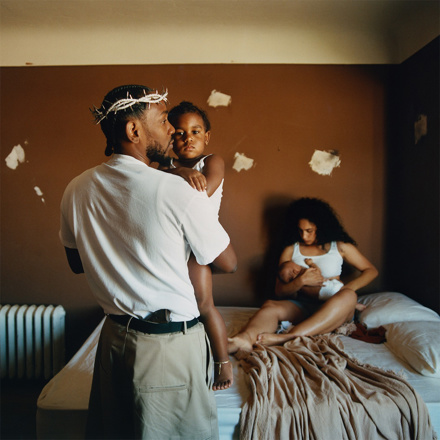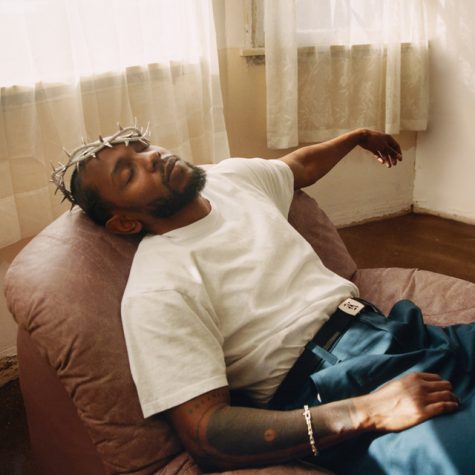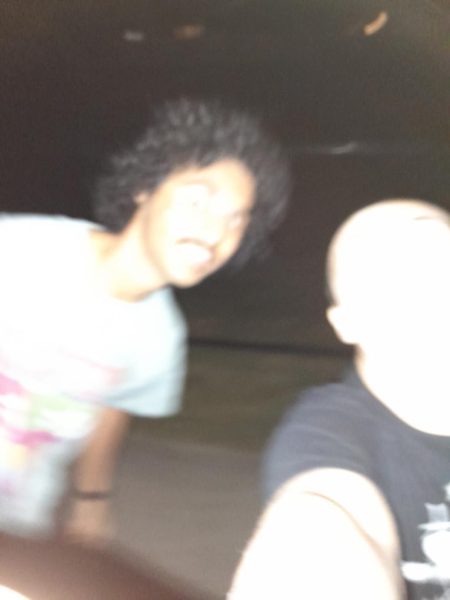Mr. Morale and the Big Steppers: Kendrick’s Most Decisive Album Yet

May 17, 2022
After 5 years of longingly waiting, Compton rapper Kendrick Lamar has finally released his new double album (and last under the TOPDAWG label) named ‘‘Mr. Morale and the Big Steppers’’. This album has had it’s most decisive reception out of most other Kendrick albums he has released, with some praising it as a ‘‘10 album’’ and his best he’s ever released, while others have stated this is far by one of his worst works because of the unorthodox sound that this album holds. It is not an album that most will be immediately attracted to soundwise, but lyrically and conceptually, this album is one of his all time greats, boasting a whopping 18 songs (including interludes). Baby Keem and Kodak Black are recurring rappers, producers, and narrators/ad libbers, with other features including Ghostface Killah of Wu-Tang, Sampha, Summer Walker, Taylour Paige, Tanna Leone, and even Beth Gibbons of Portishead, allowing it to offer a diverse array of noises.
What is the album about?
Conceptually, this album is a masterclass. It features Kendrick in a therapy session, unloading his entire life and attempting to fix and/or reaffirm his views on a variety of topics that range from sexuality to those who grew up fatherless, even touching upon cancel culture. This is by far his most personal album, as it offers a humanization of Kendrick as a person, not a god or a prophet of some sort of holy script. Just a man. This allows the album to have a rough and very deep sound, allowing for the mainstream potential of the album to go downhill but keeping the meaningful and introspective trademark Kendrick sound to be present throughout the project.

The Songs
The album begins with the song ‘‘United In Grief’’, blasting the listener’s ears with an intro similar to his previous album ‘‘Damn’’’ in the song ‘‘BLOOD’’. He then speaks about how he’s been going through issues since the release of his last album, rapping over a theatre-esque piano beat. It then switches to very rapid industrial noises, similar to what one might hear on Kanye West’s ‘‘Yeezus’’. With a combination of this piano and rapid drum beat, he raps about the early wealth he gained from his fame and success as a rapper.
It then transitions into one of the perceived singles of the album ‘‘N95’’, as it has a very mainstream sound that can be similarly found in Baby Keem’s ‘‘Melodic Blue’’. The title refers to the N95 Covid masks, which lead many to believe that the song is a critique of the Covid pandemic, what occurred, and how it was handled. Many believe the repeated phrase ‘‘take off’’ refers to the removal of masks. It fits the ranty mood one might be in while at a therapy session, unloading all one’s emotions and what they have been experiencing, especially during these past two years. He even mentions cancel culture, denouncing its use and significance.
He follows up with ‘‘Worldwide Steppers’’, which the viewer is immediately introduced into with narration provided by rapper Kodak Black, saying ‘‘Oklama’’, which is Kendrick Lamar’s alias for this album (which means ‘‘my people’’ in Choctaw). The beat consists of a repeating, pounding synth that is similar to the previous song ‘‘United in Grief’’ (but less aggressive). The song serves as a reflection of Lamar during these past years, displaying how he has started a family, overcome writer’s block through religion, and even self-criticizes himself for his previous interracial relations with white women in stating how his ancestors would be ‘‘dissapointed’’ when placing the oppressive perspective of white Americans on black american communities (which of course is not applicable to all white Americans or black communities, but is still food for thought by Kendrick, displaying his imperfections as not only a rapper and a person, but the imperfections of a music culture and a community).
‘‘Die Hard’’ is a more clubby track, as it features a recurring blip perc and synth pad with a catchy hook. The track, featuring Blxst and Amanda Reifer, is about Kendrick’s trust issues, insecurities, and errors that constitute within his relationship problems (which is further expanded upon later in the album). In his second verse, he recognizes these regrets, but he affirms himself that they won’t stop him from improving as a person and improving in terms of treatment of people.
The following track is ‘‘Father Time’’, featuring Sampha. This track is very audibly pleasing and offers a reversed vocal sample that has quickly become one of my favorite samples in a sign. Then, as in other songs, follows up with an old-school piano beat that one might hear on a Jay-Z song (it’s both very Kanye and Pharell reminiscent). Sampha gives his very dreamy, floaty vocals which ties the audible sense of the song all together nicely. The content of the lyrics are very meaningful as well, as Kendrick speaks about the father issues that one may have even when a father is present, as the cycle of toxic masculinity and generational trauma is passed down, usually from a father figure who is present in the household, for their kin to lead it down and keep the toxic cycle continuing while also speaking about the obvious, harsh negatives that occur when a father figure is not present, leading to cases of violence, drug abuse, or even gang activity.
‘‘Rich (Interlude)’’ follows, which is a spoken track by Kodak Black and Sampha. It speaks about Kodak’s past struggles as an artist to get where is he at now, and even some of the struggles he continues to face today as an extremely successful artist. He solidifies his success by ending with the line ‘‘We own property now’’, which is his way of escaping poverty.
The actual song ‘‘Rich Spirit’’ follows, with a very deep, house-esq bass beat. As the title implies (and like his other tracks), he speaks about himself in a spirit-sense, talking about his personality traits, flaws, highs, and attributes that create the person that he is. This heavily follows the theme of the therapy session he is attending (it is implied that his significant other is also there, which will be heavily supported by the next ‘‘song’’). He is close to his turning point in terms of therapeutic relief/conclusion, which will signify the beginning of the second side of the album.
The next track is ‘”We Cry Together.” I say track because it is less of a song and more of a representation of many modern, toxic couples who should not be together in the state of toxicity that this couple finds themselves in. This track features Taylour Paige as Kendrick’s significant other, and in the track, they go back in forth in an argument about their negative qualities, creating such a dissonance within the health of their relationship. One can state that is was inspired by Eminem’s ‘‘Kim’’, which draws many similarities (one of the biggest being the mass use of vulgarities). It ends with the couple ‘‘resolving’’ and ending with the statement of ‘‘stop tap dancing around the conversation’’, concluding one of the most powerful tracks on the album.
The next song is a stark contrast from what just occurred, with ‘‘Purple Hearts’’featuring a laid back, nearly lofi drum beat that one may hear on a Pharell song. It features rapper Ghostface Killah of Wu-Tang and Summer Walker. Kendrick is melodic on this track and duets with Summer Walk. He sings of love and continues themes of spirituality and self-reflection. This is the beginning of the turning point, as it is the last song on the first side/disc of the album.
‘‘Count Me Out’’ begins the second half of the album (or the second disc on this double album), begging very similar to how ‘‘United In Grief’’ began. He raps about how his relationship was only hurting him, disallowing him to love himself and care about his feelings and coming to terms with the person that he is, stating how he loves to be on his own. He then goes on to realize that the relationship is unhealthy for him and that leaving the relationship would allow him to finally be happy and try to heal the scars he previously spoke of within the album.
It leads into ‘‘Crown’’, which speaks on how his inner conflicts disable his effectiveness as the community’s leader that everyone proclaims him to be. He states repeatedly how he can’t please everyone, which draws to the feeling that he will later further express in the song ‘‘Savior’’.
‘‘Silent Hill’’ follows, which is my personal favorite song on the album. It is a very trap-inspired song featuring rapper Kodak Black actually rapping in their first collaborative track in their artistic histories. They rap about their wealth, life conflicts, and cleansing themselves from the ‘‘snakes’’ (the fake friends or relationships they have built). Some also speculate that Kendrick may be talking about the game series Silent Hill, which is supported by the lines talking about survival and ‘‘pushing them off’’ (which is what one does to zombies when no weapon is equipped). In my opinion, this is a very historic moment in both Kodak and Kendrick’s careers, as Kodak is finally put into a larger audience to witness his rapping abilities (as he undoubtedly outrapped Kendrick in this song) while Kendrick displays his versatility with very different artists.
‘‘Savior (Interlude)’’ follows, being introduced by German author Eckhart Tolle and has a verse rapped by Baby Keem. He raps about his early life experience and then transitions into his relatively recent experiences with success. He is rapping over a completely classical instrumental, no drum beat or anything. Violins and other strings. The actual song ‘‘Savior’’ then begins, with Kendrick naming big names such as himself, J. Cole, Future, and Lebron as very large inspirations within the community, but should not be looked to as gods. Simply people within the community that have large influences. A very Baby Keem inspired beat then begins with Kendrick and Baby Keem rapping over the beat with Sam Dew offering a melodic chorus. It is a political track, as it speaks on the backwards views on the Covid epidemic that many looked towards, the toxic political correctness within (American) society, and his struggles within such a broken society.
The next song is heavy, as ‘‘Auntie Diaries’’ is a breakthrough for the LGBTQ community in hip-hop, as Kendrick is one of the first mainstream hip-hop artists to address the community in a positive light such as the one offered in this song, breaking away from the homophobic tendencies naturally seen within the hip-hop community. He talks about his ‘‘aunt’s’’ (it is undecided whether this is Kendrick’s personal experience or not, but it most likely alludes to his evolved views on the transgender and LGBTQ community) transformation and how Kendrick’s character evolved over time to learn and accept such a change, as in such a culture, it is usually denied or unaccepted. The use of the slur Kendrick uses is meant to compare to the use of the slur for African Americans used by a white woman who was invited onto his stage in 2018 in the Alabama Hang Out Festival. He also uses it in the perspective of a middle schooler, who are usually raised in hostility to such attitudes. Although the delivery is rough, the message is heartfelt and supports the community as a whole (the LGBTQ and hip-hop communities both).
‘‘Mr. Morale’’ follows the track, featuring Tanna Leone and Sam Dew once again. The song reflects the generational trauma that Kendrick had to face, stating his family’s abuse issues (addiction, domestic, etc.) and even saying names such as R. Kelly and Oprah Winfrey. The song ends with yet another quote by German philosopher Eckhart Tolle. The significance of figureheads within the black community relayed within the single ‘‘The Heart Part 5’’ are continued throughout the album.
The second to last track ‘‘Mother I Sober’’ is a very heartfelt track featuring Beth Gibbons of Portishead, yet again displaying Kendrick’s versatility as an artist and his willingness to work with people who might not be considered as ‘‘safe’’ picks (Sam Dew is yet again also featured on this track). He talks about the abuse his mother faced when he was younger and how that abuse has continued to Kendrick’s life, giving a much needed spotlight on male sexual assault victims. He also speaks on the toxic sex culture that the black community has endorsed themselves within, which is the root of many cases of sexual abuse to young children within the black community. He himself states how he participated in such a culture, confirming his stance that he is not a god, but a human that makes mistakes too.
The album finisher’s ‘‘Mirror’’ ends the album with a strong, meaningful message that Kendrick leaves the audience with. He speaks about his final reflection on his fame, turning to indulgence and sowing the benefits he can achieve through such fame. He was talking about how, during his 5 year long break, he left the hip-hop world alone to build his own world and his own life. He encourages the listener to do the same, constantly repeating ‘‘I choose me I’m sorry’’, coming to an end in the therapy session and in the album.
The Verdict
This album, conceptually and lyrically, is the album of the year. Even production wise, this album breaks new ground and does not like to play safe, even when it does not sound objectively good. The features all have a purpose within the album and portray the diversity that Kendrick has as an artist. Kodak’s narration, Baby Keem’s production, Sam Dew’s reoccurring vocals, and so many more features allow for a great amount of replay-ablility to this album to uncover more of it’s layers. For many, it took several listens to simply like the album, but from there, it become one of his top three albums for many fans. It takes some time to get used to, but over time, it will grow and it will grow fast. I give this album a strong 8, but I guarantee that rating will change the more I listen to it. Until then, replay and replay I will.

